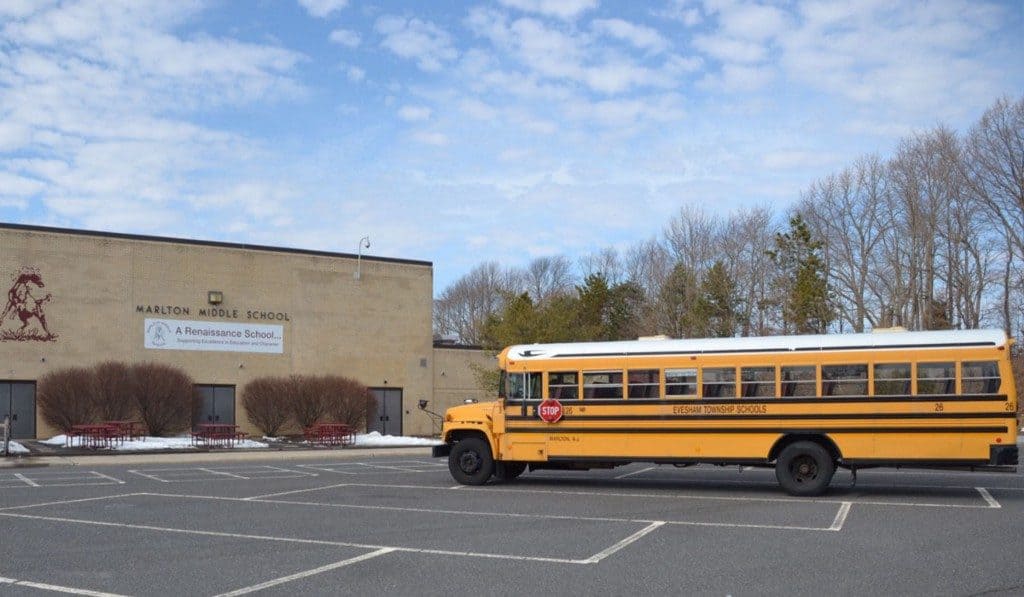
The wheels on the bus go round and round, but where do the drivers on the bus go?
If it’s the Evesham Township School District, the drivers on the bus go to the latest ETSD Board of Education meeting, where they protested any potential privatization of the district’s busing services.
The issue first arose at the board’s Jan. 24 meeting, when the board approved a contract with a consulting firm to examine the district’s busing services and configure bid packages.
In turn, private busing services can eventually offer bids on those packages, with the potential for offers to cost less than what the district currently spends to employ its own drivers and purchase its own buses.
The district’s decision to explore potential privatization comes at a time when it faces steep cuts to state aid in the coming years, with the district estimated to lose about $9 million in total by the 2024–2025 school year.
At last month’s meeting, several board members gave indications they would most likely vote against privatization regardless of savings, while other board members argued the board should complete its “due diligence” and examine the process nonetheless.
As of this week’s meeting, however, the BOE did not have any new information to publicly share about the process, but that did not stop dozens of staff members from the district’s transposition department, as well as members of the Evesham Township Education Association, from speaking in defense of the district’s current drivers and services.
Transportation staff wore similar yellow shirts and carried signs denouncing privatization, with members of the audience often loudly clapping and cheering when speakers used their time during the portion of the meeting reserved for comments from the public to speak against privatization.
Russell Bowles, first vice president of the ETEA, stood before the BOE with several other members of the ETEA’s executive board and read a statement contending the low pay and lack of benefits at many private busing services lead to a frequent turnover of employees and lack of a consistent, quality staff.
Bowles pointed to several incidents from the start of just this year in districts across New Jersey that utilize private busing, such as the driver of a bus carrying 22 students from the Gloucester County Institute of Technology who was set to face citations following a crash with a tractor-trailer on Jan. 7.
Or most recently, he noted the incident from Feb. 20 involving the driver of a bus carrying 12 special needs students in Newark, in which the driver allegedly overdosed on heroin and crashed the bus into a tree.
“We could all go on for hours about the negative effect of privatization, but the bottom line is — no one in this community should have to worry about who is maintaining our schools and who’s driving the bus,” Bowles said.
One resident speaking against privatization at the meeting was Andy Severin, who said that while the board might not normally hear from residents saying “increase my taxes,” he also didn’t want to see the district lose its “edge” in providing great services.
Severin also noted that by employing its own staff, the district has a greater control over the actions of its employees, and with many employees most likely living locally, Severin said the district would be “hurting its own” with privatization.
“To send it out to a for-profit — they’re just not looking at the same thing that you are,” Severin said.
Another resident to speak at the meeting was Christine Campbell, whose 4-year-old daughter attends the district’s preschool disabled program at Rice Elementary, as she cannot walk unassisted or speak.
Campbell said the district’s transportation staff was “fantastic” and open to multiple options when determining how to best transport her daughter to school, including finding a specialty harness seat compatible with a bus and aides training with a physical therapist to learn how to help her daughter walk up stairs and down the aisle.
“I feel pretty certain that the outcome would have been different from a private company, and I think if you switch, it will be,” Campbell said.
Although members of the BOE did not comment on any potential privatization plans or respond directly to those who spoke at last week’s meeting, several BOE members did thank those who spoke for sharing their concerns and also thanked those who reached out through email across the past several weeks.









